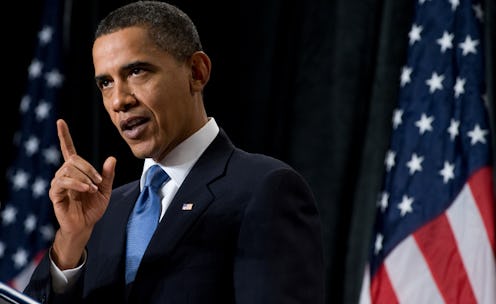News
7 Best Quotes From Obama's Baltimore Speech
President Obama delivered a lengthy, heartfelt speech touching on Baltimore, its protests, and how the recent wave of police brutality cases occurring around the country is nothing new. Delivering six main points, Obama's best quotes from his Baltimore speech ranged from congratulating the peaceful activists in the city to unveiling a grant program for police departments around the country interested in purchasing body cameras for their officers. That grant money will be available to departments willing to train their officers as well.
Obama addressed the issues unfolding in Baltimore during a press conference that was entirely unrelated to the event. The White House is hosting Japanese Prime Minister Shinzo Abe for a dinner, and thus the two leaders held a joint press conference this Tuesday afternoon, mere hours before the dinner, to discuss the important bilateral talks they'll be engaging in. The president apologized to Abe in the middle of his speech on Baltimore, simply saying, "I’m sorry, Mr. Prime Minister, but this is a pretty important issue for us."
The entire nation is continuing to watch demonstrations unfold in Baltimore, despite a week-long 10 p.m. curfew being implemented. As with the case of police brutality itself, public outcry certainly isn't going away. For that reason, Obama had to say something. The most important takeaways from Obama's speech are below.
On violence only detracting from the real message of the Baltimore protests:
The violence that happened [yesterday] distracted from the fact that you had seen multiple days of peaceful protests that were focused on entirely legitimate concerns of these communities in Baltimore, led by clergy and community leaders.
On how the media isn't helping the public's perception of the protests, either:
One burning building will be looped on television over and over and over again, and the thousands of demonstrators who did it the right way I think have been lost in the discussion.
On how there were more peaceful protestors than violent rioters:
The overwhelming majority of the community in Baltimore I think have handled this appropriately, expressing real concern and outrage over the possibility that our laws were not applied evenly in the case of Mr. [Freddie] Gray, and that accountability needs to exist. And I think we have to give them credit.
On those protestors who cleaned up the mess that was made from looters and more violent activists:
My understanding is, is you’ve got some of the same organizers now going back into these communities to try to clean up in the aftermath of a handful of criminals and thugs who tore up the place. What they were doing, what those community leaders and clergy and others were doing, that is a statement.
On how police brutality, especially against underserved communities, appears to be commonplace:
Since Ferguson, and the task force that we put together, we have seen too many instances of what appears to be police officers interacting with individuals — primarily African American, often poor — in ways that have raised troubling questions. And it comes up, it seems like, once a week now, or once every couple of weeks... This is not new, and we shouldn’t pretend that it’s new.
On how it's not just the police that need reforming, it's the entire criminal justice and education system — and it falls on all of us:
If we are serious about solving this problem, then we’re going to not only have to help the police, we’re going to have to think about what can we do — the rest of us — to make sure that we’re providing early education to these kids.
On making opportunities available to the underserved:
[Let's] make sure that we’re reforming our criminal justice system so it’s not just a pipeline from schools to prisons; so that we’re not rendering men in these communities unemployable because of a felony record for a nonviolent drug offense; that we’re making investments so that they can get the training they need to find jobs.
